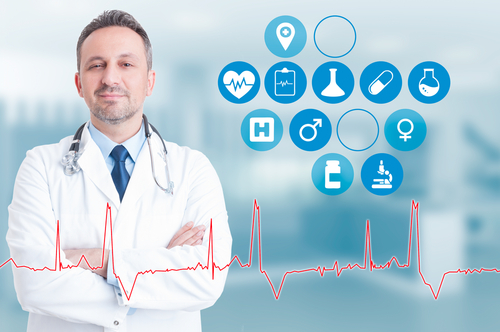Popular Health Apps for Doctors
M3 India newsdesk May 19, 2017
Combining communication and task organization needs in a hand-held device, smartphones have become ubiquitous with doctors and patient alike.

This modern handheld tool has earned the place of “must-haves” in modern day living.
Medical applications make smartphones useful tools in the practice of evidence-based medicine at the point of care, in addition to their use in mobile clinical communication. Also, smartphones can play a very important role in patient education, disease self-management, and remote monitoring of patients.
A study by Franko, O.I. & Tirrell, T.F. in 2012 stated that the most commonly used app types were drug guides followed by medical calculators, coding and billing apps and pregnancy wheels. With rapid advances in technology, new functionalities are being added each day and newer areas are being harnessed.
We attempt to share with you the most modern categories of health apps used by the doctors currently. A systematic review done in the year 2014 by Mosa ASM, Yoo I, Sheets L. (A Systematic Review of Healthcare Applications for Smartphones) published in BMC Medical Informatics and Decision Making, classified the plethora of available apps in the following broad categories based on functional similarity: disease diagnosis, drug reference, medical calculators, literature search, clinical communication, HIS clients, and medical training and general health.
Disease Diagnosis Applications
Mobile applications which act as diagnostic assistants are popular. The applications provide medical references and information on infectious diseases, pathogens, diagnosis, treatment, medications, differential diagnosis etc.
Few examples of such popular apps are: Johns Hopkins Antibiotic Guide, 5-Minute Clinical Consult, 5-Minute Infectious Diseases Consult, Sanford Guide to Antimicrobial Therapy , ePocrates ID, Infectious Disease Notes (ID Notes), Pocket Medicine Infectious Diseases (PMID), and IDdx.
Smartphone-based disease diagnosis applications are also a widely used resource by the clinicians. These applications come in handy for identifying appropriate laboratory tests based on symptoms, decreasing unnecessary tests and reducing the cost of care. Radiology tests, for instance, making use of the “eRoentgen Radiology Dx” application, the clinician can avoid very expensive and unnecessary tests are undesirable reducing the cost of care and improving patient safety
Drug Reference Applications
The drug reference applications are handy tools for information about the drug reference applications such as drug nomenclature, drug dosage, pharmacology and their indications. Some of the apps also include data on drug-drug interactions, contraindications, cost, and identifying characteristics.
Few examples of such popular apps are: Epocrates and Skyscape’s RxDrugs
Epocrates is believed to be the most commonly accessed drug reference application. While the drug-drug interaction checking feature of drug reference applications like Skyscape’s RxDrugs is considered to be a very useful evidence-based resource at the point of care by the medical fraternity.
Medical Calculator Applications
Medical calculator or clinical calculator is another immensely popular category of mobile applications used by a variety of clinicians. It allows calculations of various clinical scores and health indices such as body mass index (BMI), body surface area (BSA), coronary heart disease risk, individual drug dosing, etc. Usually, calculation of clinical scores or indices involves complex formulas using several input parameters. Medical calculators allow the user to feed in observed parameters and the tool calculates scores using a standard formula. This eliminates the need to use or even know the actual formula for calculating a clinical score or index. For instance, the “Paeds ED” application calculates drug dosages for children based on their age in years. The calculation of drug doses for pediatric patients is very crucial during medical emergencies, and a tool like this one is highly valued.
Literature Search Applications
Apps that facilitate literature search for healthcare professionals are another from the popular category as these help the clinicians keep abreast with the latest medical news effortlessly.
The free PubSearch and fee-base PubMed on Tap are two commercial applications for the iOS platform that facilitate PubMed/MEDLINE search from iPhone. Additionally, several medical journals, such as the New England Journal of Medicine, The Lancet, and BMJ (formerly the British Medical Journal), provide apps that allow articles to be viewed on mobile devices.
Clinical Communication Applications
Communication is the primary premise of existence of smartphones and mobile apps that enhance this feature are extremely popular with the medical fraternity. This includes voice and video calling, text messaging, email messaging, multimedia (text, image, and video) messaging, and conferencing.The use of mobile phone communication in critical care environments facilitates rapid communication, reducing the risk of medical errors
Medical Training Applications
Smartphone applications have found tremendous usability for educational purposes such as medical training and continuing medical education (CME).For example, QuantiaMD has a mobile CME app that provides well-scripted interactive case studies that can be shared with colleagues.
Medical devices and apps are already invaluable tools for HCPs, and as their features and uses expand, they are expected to become even more widely incorporated into nearly every aspect of clinical practice.
-
Exclusive Write-ups & Webinars by KOLs
-
Daily Quiz by specialty
-
Paid Market Research Surveys
-
Case discussions, News & Journals' summaries